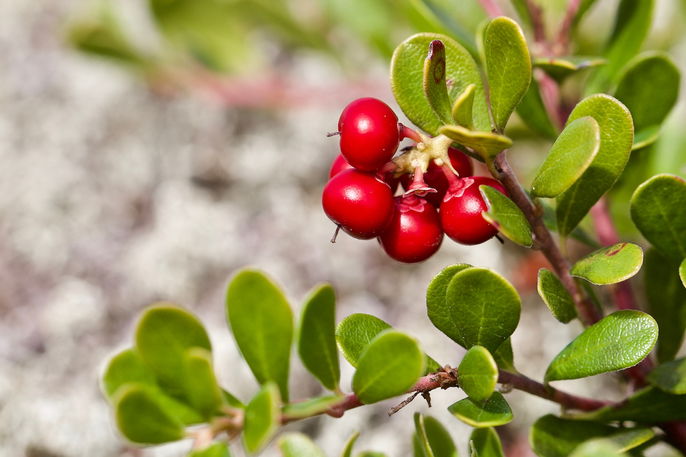A bearberry is a medicinal plant that can be used to treat infections in the urinary tract (like cystitis or urethritis), as well as kidney stones or acute diarrhea. This plant grows as a low-lying shrub and contains naturally antibacterial, anti-inflammatory, antiseptic and diuretic properties
The normally used parts of bearberry shrub, which are considered to be of the Arctostaphylos species of shrubs, are its leaves, from which medicinal substances are extracted for the preparation of tea, poultices, capsules or tinctures.
Bearberries can be found in health food stores or compounding pharmacies. Although they can offer many health benefits, they di not replace the medical treatment prescribed by your doctor, and should be used as guided by a doctor or medicinal plant specialist.

What it's used for
Bearberry is indicated to help in the treatment of:
- Urinary tract infections, like cystitis or urethritis
- Kidney stones
- Kidney inflammation or pyelitis
- Enlarged prostate
- Uterine cramps
- Abscesses or boils
- Vaginitis
- Acute diarrhea
The benefits of bearberry are due to the presence of arbutin, flavonoids, hydroquinones, tannins and ursolic acid in its composition. These substances contain antibacterial, anti-inflammatory, antiseptic and diuretic properties.
Although bearberries contains many benefits, this plant should not replace medical treatment prescribed by your doctor, nor should it be used to achieve health benefits without guidance from a doctor or medicinal plant specialist.
Can bearberry lead to weight loss?
Bearberry does not influence weight loss, as it has no effect on the elimination and reduction of body fat.
However, as it has a naturally diuretic action and triggers the elimination of water from the body. This can give the false sensation of weight loss.
How to use
The bearberry leaves can be used to prepare tea, a poultice, capsules or tincture, for example.
1. Bearberry tea
Bearberry tea increases urine elimination, and can cleanse the urinary tract and reduce swelling. It can be prepared to treat cystitis, urethritis, kidney stones or kidney inflammation.
This tea has antimicrobial activity, and can reduce the growth of microorganisms like E. coli bacteria that cause infections in the bladder, urethra and kidneys. It is a great home remedy the treatment of urinary tract infections.
Ingredients
- 2 tablespoons of dried bearberry leaves
- 1 liter of water
Directions
Boil the water and bearberry leaves for approximately 15 minutes. Strain and drink while warm 2 to 3 cups a day, for a maximum of 5 days. Do not repeat this treatment more than 5 times a year.
Also recommended: Home Remedies for UTI: 10 Teas, Juices & Natural Treatments tuasaude.com/en/home-remedies-for-uti2. Bearberry capsules
Bearberry can also be found in the form of capsules, in compounding pharmacies or health food stores. They are prepared with the dry extract of this medicinal plant.
Doses may vary depending on the amount of dry extract in the capsule composition. The recommended dose is about 1 to 6 g of bearberry per day, for a maximum of 7 days.
Therefore, for 500 mg bearberry capsules, the recommended dose is one capsule, taken up to 3 times a day. As for the 350 mg capsules, the recommended dose is 2 capsules in the morning and 2 capsules in the afternoon.
Bearberry capsules should only be taken as guided by a doctor or medicinal plant specialist, as dosing can vary depending on the condition being treated.
3. Bearberry tincture
A bearberry tincture in a 20% concentrated solution is administered through 20 drops diluted in water, taken twice a day.
The use of the tincture should only be done as guided by a doctor
4. Bearberry poultice
A bearberry poultice can be used to treat skin abscesses or boils.
Ingredients
- Bearberry leaves
Directions
Crush the bearberry leaves and add a small amount of water. Then apply this mixture over the area of the skin with an abscess or boil.
Possible side effects
Bearberry can cause side effects when used in larger amounts than recommended. High doses can lead to ringing in the ears, nausea, vomiting, irritability, insomnia, feeling short of breath, or seizures.
Furthermore, when used in excess, bearberry can cause liver poisoning, due to the hydroquinones present in its composition.
Contraindications for use
Bearberry should not be used by children under 12 years of age, pregnant or breastfeeding women, or by anyone with a history with stomach problems such as gastritis or ulcers, for example.






























